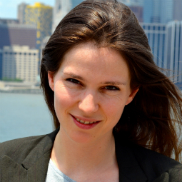Mon, 09/28/2015 - 03:14
'It’s raining men at the UN'... which is a big problem

Amassing the world’s movers and shakers in one place, the UN General Assembly makes it easy to assess the global ratio of men and women in power. Hibaaq Osman, a women’s rights advocate from Somalia, is doing just that.
“Look at how many people are coming through the corridors, coming down the steps -- the majority of them are men,” she said on Saturday afternoon, as thousands of suited delegates filed out of the building in Turtle Bay. She actually knows the official percentage (it’s 74%), but she likes the physical demonstration the GA provides. “It's raining men… Isn’t it awful?”
Osman, who runs a women’s rights network from Cairo, Egypt, is in New York to remind world leaders about women. Her case is strong: women are capable peace envoys, educators, and diplomats and yet, most of the UN’s work is carried out by men.
The numbers speak for themselves. Today on the Security Council -- which is charged with the monstrous task of maintaining world peace but has recently been rendered impotent by internal differences -- only four of the 15 members are women.
In war-torn countries like Syria, Libya and Iraq, where Osman concentrates much of her work, she believes involving women in peacebuilding could help to resolve those conflicts. If women are then represented fairly in the running of more stable societies -- in education, health, and politics -- future conflicts might be avoided too, she says.
“Society breaks down when half of it is not fully participating, haven’t we learnt that lesson yet?”
Osman comes across as determined but frustrated. It’s not easy to reverse thousands of years of male dominance. She thinks her best bet is through the UN.
“The UN literally represents the world,” she says. “It has to start here, because here really means everywhere.”
Less talk more action
The UN held its biggest ever women’s empowerment conference on Sunday, with dozens of heads of state speaking in favour of gender equality. Most of them were men.
The side event came as the world body launched its Sustainable Development Goals, or SDGs (an ambitious follow-up from the Millennium Development Goals set in 2000, which have just expired).
One of the SDGs is to “achieve gender equality and empower all women and girls” by 2030.
If it seems a little ambitious, that’s because the SDGs just are -- another is to "end poverty in all its forms everywhere", also by 2030...
Osman says she's seen promises made before, and is not impressed.
“Everyone already promised gender equality in 1995 [at the fourth World Conference on Women], and what has happened since then? Very little has changed.”
She believes that instead of talking about women, they need to be actively involved. “There’ll be no development, and neither will it be sustainable, if women are not fully participating,” she said.
German Chancellor Angela Merkel seems to be onto a similar idea.
“Commitments are good,” she said at the women’s forum on Sunday. “Action is better.”
Tags for all blogs :
Comments or opinions expressed on this blog are those of the individual contributors only, and do not necessarily represent the views of FRANCE 24. The content on this blog is provided on an "as-is" basis. FRANCE 24 is not liable for any damages whatsoever arising out of the content or use of this blog.



0 Comments
Post new comment